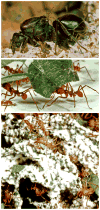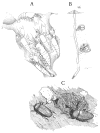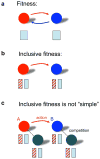The evolution of eusociality
- PMID: 20740005
- PMCID: PMC3279739
- DOI: 10.1038/nature09205
The evolution of eusociality
Abstract
Eusociality, in which some individuals reduce their own lifetime reproductive potential to raise the offspring of others, underlies the most advanced forms of social organization and the ecologically dominant role of social insects and humans. For the past four decades kin selection theory, based on the concept of inclusive fitness, has been the major theoretical attempt to explain the evolution of eusociality. Here we show the limitations of this approach. We argue that standard natural selection theory in the context of precise models of population structure represents a simpler and superior approach, allows the evaluation of multiple competing hypotheses, and provides an exact framework for interpreting empirical observations.
Figures




Comment in
-
Call for a return to rigour in models.Nature. 2010 Oct 7;467(7316):661. doi: 10.1038/467661d. Nature. 2010. PMID: 20930826 No abstract available.
-
Better living through physics.Nature. 2010 Oct 7;467(7316):661. doi: 10.1038/467661a. Nature. 2010. PMID: 20930827 No abstract available.
-
Ground truth is the test that counts.Nature. 2010 Oct 7;467(7316):661. doi: 10.1038/467661c. Nature. 2010. PMID: 20930828 No abstract available.
-
Inclusive fitness is just bookkeeping.Nature. 2010 Oct 7;467(7316):661. doi: 10.1038/467661b. Nature. 2010. PMID: 20930829 No abstract available.
-
Inclusive fitness theory and eusociality.Nature. 2011 Mar 24;471(7339):E1-4; author reply E9-10. doi: 10.1038/nature09831. Nature. 2011. PMID: 21430721 Free PMC article.
-
Only full-sibling families evolved eusociality.Nature. 2011 Mar 24;471(7339):E4-5; author reply E9-10. doi: 10.1038/nature09832. Nature. 2011. PMID: 21430722
-
Kin selection and eusociality.Nature. 2011 Mar 24;471(7339):E5-6; author reply E9-10. doi: 10.1038/nature09833. Nature. 2011. PMID: 21430723
-
Inclusive fitness in evolution.Nature. 2011 Mar 24;471(7339):E6-8; author reply E9-10. doi: 10.1038/nature09834. Nature. 2011. PMID: 21430724
-
In defence of inclusive fitness theory.Nature. 2011 Mar 24;471(7339):E8-9; author reply E9-10. doi: 10.1038/nature09835. Nature. 2011. PMID: 21430725
References
-
- Hölldobler B, Wilson EO. The Ants. Harvard Univ. Press; 1990.
-
- Foster KR, Ratnieks FLW. A new eusocial vertebrate? Trends Ecol Evol. 2005;20:363–364. - PubMed
-
- Hamilton WD. The genetical evolution of social behaviour, I, II. J Theor Biol. 1964;7:1–52. - PubMed
-
- Wilson EO. The Insect Societies. Harvard Univ. Press; 1971.
-
- Wilson EO. Sociobiology: The New Synthesis. Harvard Univ. Press; 1975.
Publication types
MeSH terms
Grants and funding
LinkOut - more resources
Full Text Sources
Other Literature Sources
Miscellaneous

